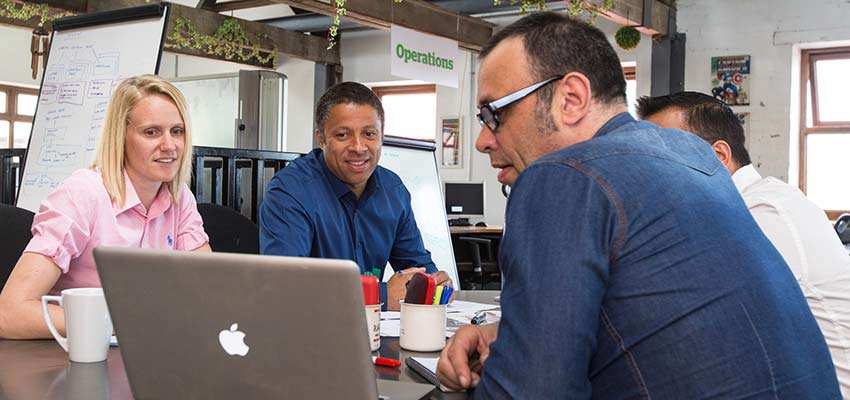In your freelance career, you’ll inevitably run into a situation where you’re bidding against several competitors for a project. That competition may not only include others in the freelance space, but multiperson agencies as well.
This can lead to an interesting choice for clients. Will they go with the team-based approach or choose to deal with a single person? The decision isn’t an easy one by a longshot. Each route has its own pros and cons – which we’ll dive into in a bit.
But for freelancers, it can feel like you’re severely outgunned when competing against larger companies. When you think about it, even a 2-person agency is (in manpower, at least) twice the size of a solo freelance business. As a side note, I am amazed by even the most basic arithmetic.
So, in a David vs. Goliath type of scenario, is this a fair fight? Let’s conduct a “weigh-in” and see who comes out on top.
Full disclosure, I write this as a longtime freelance designer. That’s the life experience I’ve had, and certainly this article will reflect that. But I also aim to be fair in the comparison. If that’s not the case, call me out in the comments. Now, with that disclaimer out of the way, here’s the opening bell!
Round 1: Breadth of Services
No matter their size, every business has a decision to make regarding which services to offer. For freelancers, it’s often a matter of figuring out what you’re best at and how each potential offering can affect your ability to do your job. If a particular service isn’t your forte or gets in the way of your core business, it’s probably best to avoid it altogether.
Agencies have the same vital decision to make, but their larger size means that they have a bit more leeway in this area. They often branch out into related services that allow them to offer a proverbial full suite. This tends to add a lot of convenience for larger clients who are looking for a one-stop shop for all of their needs.
For example, while a freelancer may decide to forgo such “extras” as SEO and email marketing, an agency just might have the resources to offer these services. In the right situation, that provides them with a definitive edge.
The best solution for freelancers isn’t to try and out-service larger competitors. Instead, focus on your strong points and sell your expertise. You can’t be everything to everyone, so just be you.
While agencies certainly have an advantage in the breadth and depth of what they can offer, it doesn’t necessarily mean that every client will want or need the whole package. But for those who feel more comfortable dealing with a single company that can provide ample resources, the decision may be a bit of a slam dunk.
Advantage: Agencies

Round 2: Cost
The varied pricing structures of the web design industry means that the same project can see wildly different cost estimates. And, while there are undoubtedly freelancers who charge high-end fees, it’s usually a safe bet that agencies will be among the most expensive options in an apples-to-apples comparison.
One of the biggest reasons for this is the mere fact that agencies need to pay multiple salaries. The more people you need to pay, the more that drives up the cost. Overhead costs, such as office space, are also a consideration here. But the move to “distributed” agencies, where employees work remotely from wherever they happen to be, can negate that a good bit.
Another potential price difference comes from the scope of services offered, as mentioned above. An agency that offers more services may add those extras into the overall cost. They might even make the argument that this provides more overall value – if the client requires these additional offerings.
Solo freelancers don’t have to worry about employees, although there is sometimes a need to bring in an outside contractor. Even so, the absence of paying someone else a steady salary every week, month or year should result in a lower price for the client. And those who work from home have yet another potentially large cost savings.
Advantage: Freelancers
Round 3: Quality of Service
Quality is a very subjective thing and can encompass a wide range of criteria. In this case, we’re talking about:
- The overall results of the final product (i.e., does it satisfy the client’s needs and wants);
- The client’s experience of working with the agency/freelancer to develop that product;
- The service provided after the final product is launched
The results here are completely dependent upon the person(s) working on the project. Either a freelancer or an agency could fail this test.
But I think it’s worth mentioning that the overall quality of service has a lot to do with the relationship you develop with a client. Again, this can go either way. But one potential advantage a freelancer has here is that the client only has one single point of contact. Agencies may have several links in the chain of client relations, which offers more opportunities to fall short.
Of course, the reverse argument is that an unresponsive or difficult freelancer means that the project fails outright. At least an agency might have others to pick up the slack for a fellow team member who isn’t pulling their own weight.
Advantage: Tie

Fair is Fair
So, does a freelancer bidding against an agency have a fair shot? Based on my experience, I think that they do in most situations. But I’ve also found there is a certain amount of stigma associated with freelancers. Some see us as unqualified simply because we’re not part of some large conglomerate and don’t work in a fancy office building. There’s not much you can do there.
However, most often clients will choose the company that provides the best match for their needs. When they consider what services are offered, how much it costs and how that fits into their overall goals, freelancers can win their fair share of projects.
That being said, it’s easy to feel afraid that you may not have a real chance to book a new client when competing against larger companies. My advice is this: If you want the project, go for it. You may just find that you have more to offer than you think.
Related Topics
Top